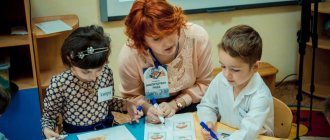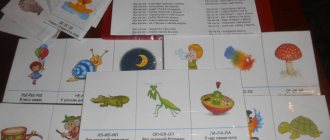Article:
A distinctive feature of children is that they perceive any information better in games, since the gaming component increases interest in the process, enhances attention and concentration, and repeated repetitions allow even the most absent-minded kids to absorb knowledge.
The competitive moment is very important for born leaders. During the game, a child’s character, peculiarities of imagination and thinking, activity, emotionality, level of social adaptation and a progressive need for contact and communication are revealed. Didactic games for speech development are a special form of education for preschool children, which allows you to enrich, improve, activate and consolidate vocabulary in the process of play - one of the most important means of harmonious formation and education of a child’s personality.
Depending on the material used, didactic games for speech development are of the following types:
- Games with objects - toys, improvised and natural materials;
- Board games using printed materials;
- Word games.
Speech development through didactic games
The development of speech through didactic games occurs by replenishing vocabulary, teaching in a playful way the skills of using words (activating vocabulary), and improving communication skills.
During the period of preschool preparation, the child needs to master a vocabulary that allows him to communicate without problems with peers and adults, successfully acquire school knowledge, and understand the material presented (the content of literary works, the formulation of mathematical problems, etc.). Therefore, the main task of preschool education is the maximum development of speech, which occurs more effectively and efficiently through didactic games.
Didactic games for speech development successfully solve the following problems in preschool education of children:
- Provide quantitative accumulation of vocabulary necessary for full communication;
- Helps in understanding the meanings of words and their correct use with other words;
- Allows you to master the general meanings of words based on identifying common characteristic features of objects, actions or phenomena;
- Improve figurative thinking and its expression by verbal description, thanks to the use of special speech constructions;
- As cognitive abilities develop, didactic games for speech development help expand the objective conceptual content of words;
- Some games with ethical tasks, along with improving vocabulary, teach the inclinations of social ethics and morality;
- Stimulate the imagination, activating and enriching the preschooler’s vocabulary in an entertaining playful way;
- Develop logical and imaginative thinking necessary to solve assigned game problems;
- They not only help expand your vocabulary, but also actively introduce new words into everyday communication.
The vocabulary of a preschooler is significantly inferior in volume to the vocabulary of an adult. The main task of speech development through didactic games is to quantitatively enrich the child’s vocabulary by increasing the volume of accumulated knowledge about the world around him, to activate and teach him to use it competently.
“Speech development of preschool children through play activities”
From the experience of working as a teacher
first qualification category
Tsygantsova Elena Viktorovna,
MBDOU "Kindergarten No. 16"
«Speech development of preschool children through play activities»
Timely mastery of speech by a child is one of the important areas in the pedagogical work of a preschool educational organization. It is necessary to create conditions for the development of communication skills in preschoolers and the expression of their thoughts. The development of coherent speech includes: mastering the sound side of the language, the lexical and grammatical structure of speech and occurs in the close relationship of all aspects of speech. The problem of the development of coherent speech was reflected in the studies of K.D. Ushinsky, L.N. Tolstoy. L.S. Vygotsky, A. A. Leontiev. They point to the complex organization of coherent speech and the need for special speech education.
Researchers reveal the content of the concept of “coherent speech, as a semantic, detailed statement that ensures communication and mutual understanding.”
The main function of coherent speech is communicative. It is carried out in two main forms - dialogue and monologue. Each of these forms has its own characteristics, which determine the nature of the methodology for their formation.
Dialogical speech is a clear manifestation of the communicative function of language. Dialogue takes place in a specific situation and is accompanied by gestures, facial expressions, and intonation. Monologue speech - coherent, logically consistent
an utterance that takes place over a relatively long period of time. A monologue is not designed for an immediate reaction from listeners. It has a more complex structure and expresses the thoughts of one person. These forms of speech differ in motives. A monologue is stimulated by internal motives (the content and linguistic means used in the monologue are chosen by the speaker himself), and dialogic speech is stimulated not only by internal, but also by external motives, for example: the situation in which the dialogue takes place, the interlocutor’s remarks.
The development of both forms of coherent speech plays a leading role in the process of the child’s speech development and occupies a central place in the overall system of work on speech development in preschoolers. Coherent speech performs the most important social functions: it helps the child establish relationships with the world around him, determines and regulates the norms of behavior in society, which is a decisive condition for the development of his personality. It should be noted that the development of coherent speech in preschoolers
occurs gradually, along with the development of thinking and is associated with the complication of children's activities and forms of communication with the outside world. So, for example: for children of senior preschool age the following features of the development of coherent speech are characteristic:
- actively engage in conversation and may participate in a collective conversation;
— the nature of children’s dialogue depends on the complexity of the tasks solved in joint activities;
- retell fairy tales and short stories. - do not know how to correctly formulate questions, supplement and correct the answers of their comrades;
- their stories in most cases copy the example of an adult and contain violations of logic;
- sentences within a story are often connected only formally (for example:
words again, later).
A huge role in the development of a child’s coherent speech belongs to play, the leading activity of preschool children. The game is an effective means of shaping the personality of a preschooler, his moral and volitional qualities; it fulfills the child’s need for communication and knowledge of the world around him. The game develops imagination, fantasy, and creates the basis for the formation of an initiative, inquisitive personality. Game activity takes place in the process of information exchange between its participants, which determines its significance for
speech development of children. The game gives the child pleasure and joy, and these feelings are a strong means of stimulating active speech perception and independent speech activity. “The motivation of gaming activity is ensured by its voluntariness, opportunities for choice, elements of self-affirmation, competition, and satisfaction of the need for self-realization.” Games differ in content and characteristics. importance in education and training. Let’s take a closer look at games aimed at
development of coherent speech of a preschool child. For example:
Role-playing game.
Goal: expand your vocabulary, correct sound pronunciation, the ability to correctly express your thoughts, strengthen the skill of constructing sentences. The central point of the role-playing game is the role that the child takes on. At the same time, he does not simply call himself by the name of the corresponding adult, he tries to act like an adult, whose role he has taken upon himself and thereby identifies himself with him. The playing role in ko in a concentrated form embodies the child’s connection with the world of adults.
Games to develop fine motor skills. Research by domestic physiologists confirms the connection between hand development and brain development and proves that targeted work on the development of fine motor skills helps overcome various disorders in the child’s psychophysical sphere. The development of finger movements is interconnected with speech function. If the development of fine motor skills lags behind, then speech development is also delayed, although general motor skills may be normal. There are many games and exercises to develop fine motor skills of the fingers. For example:
Finger theater is an exciting didactic game that:
-stimulates the development of fine motor skills; introduces the child to the following concepts: shape, color, size;
- develops imagination, memory, thinking, attention;
- helps improve vocabulary and activates speech functions.
Lacing games promote the development of:
-sensorimotor coordination;
- spatial orientation, contribute to the assimilation of the concepts “above”, “below”, “right”, “left”
-creative abilities.
Games with cereals and seeds.
Cereals are a universal material. We take a tray and spread small grains (for example, semolina) on it. Then you can draw simple shapes: squares, circles, zigzags, a house, a sun.
Bags of cereal are exercises for the development of tactile sensitivity and complexly coordinated movements of the fingers and hands.
Exercises with beads.
Various stringing activities are excellent for developing fine motor skills. You can make beads from cardboard circles, squares, tree leaves, rowan berries, etc. The size of the beads depends on the age of the child.
Didactic games.
A didactic game is one of the forms of an adult’s educational influence on a child. The educational significance of a didactic game does not appear openly, but is implemented through a game task, rules, and actions. To develop children’s coherent speech, the following types of didactic games are used:
— games with objects (toys, real objects, natural materials, objects of decorative and applied art, etc.);
- tabletop-printed (paired pictures, dominoes, cubes, lotto),
-word games. For example, the game “Answer quickly” (goal: to train children in classification, comparison, generalization, to practice agreeing numerals and adjectives with nouns).
Timely and complete speech formation in preschool age
is considered a major component in the development and future success of schooling.
List of references and sources
1. Baranova G. A. Preparing teachers for the use of modern pedagogical technologies in working with children with disabilities // News of the Tula State University, Pedagogy 2021. No. 1
2. Minesva Yu.V., Salikhova 3., Levshina N.I. Forms of work on speech development in preschoolers // International Journal of Experimental Education. 2014. No. 7-2.
3. Nishcheva N.V. Educational fairy tales: A series of classes on the development of the lexical composition of the language, improving the grammatical structure of speech, the development of sacred speech in preschool children: educational and methodological manual-summary. St. Petersburg: Detstvo-press, 2002.
4. Development of speech and creativity in preschool children. Games, exercises, lesson notes, ed. Ushakova O. S. M.: Sphere shopping center. 2015.
Didactic games for the development of speech for children from two to three years old
At the age of 2-3 years, the child must master the names of items of clothing, dishes, furniture, toys that surround him in everyday life and arouse his interest. During this period, the names of the actions performed with these objects are also mastered.
The task of educators during this period, with the help of didactic games, is to teach children to name and distinguish:
- Parts of objects, parts of the body of animals and humans;
- Different sizes;
- Primary colors;
- Main taste qualities;
- Some physical qualities and properties.
It is necessary to develop the ability of children to denote in one word a group of similar objects united by a common feature and to distinguish between similar groups of objects.
It’s good at this age to start teaching your child to talk on the phone with an invisible interlocutor. This is a kind of didactic game that develops not only vocabulary, but also abstract thinking, the ability to express one’s thoughts without the help of gestures. You should structure such a conversation correctly, asking simple questions that do not require complex answers; you can make a telephone conversation, for example with your grandmother, a daily ritual.
Didactic games for speech development are also recommended, the essence of which is clear from the name - “Name it correctly...”, “What has changed...”, “What does it consist of...”, etc.
The main goal of such games at this age, while improving vocabulary, is to instill in the child an interest in vocabulary activities.
Speech development through didactic games at four years old
At four years of age, the child’s vocabulary is further expanded, with a more detailed delving into the details and characteristics of the world around him. This is necessary to enhance differentiated perception and deepen knowledge about the characteristics of objects, their purpose, structure and expand the understanding of qualities and properties. At this age, the baby must learn the basic techniques of orientation in space and time, master the corresponding words (morning, evening, forward, backward, first, then). Didactic games for speech development, recommended for 4-year-old children, should begin with the phrases “What first, what then...”, “When it happens...”, “What has changed...”, “What will happen if...”, “What can be done with... ", "What can you do with...", "More than...Less than...", "One...many..." and the like.
It’s good if the child talks every evening about how he spent the day, what he played and with whom, what he saw and did. By answering parents' leading questions during role-playing games using their favorite toys, the baby will develop faster, expanding his vocabulary and improving his ability to use it.
Speech development through didactic games at 5-6 years old
Senior preschool age is a period when children, with the help of didactic games, actively acquire spoken language, mastering vocabulary, phonetics, and grammar. The vocabulary expands, based on in-depth knowledge of the surrounding world. The main task of didactic games for the development of speech at this age, along with further replenishment of the vocabulary, is to teach the child dialogic and monologue speech.
In a playful way, special communicative situations should be created in which the child must maintain a conversation, starting and conducting a dialogue. There are game moments in which the adult and the child change places and the child asks questions.
During the period of preschool preparation, it is important to teach the child narrative speech, the ability to compose and pronounce monologues - for this, in the form of a game, you can offer to describe specific situations, such as a long journey, a visit to the zoo, a fairytale journey, with a detailed description of the details (objects, properties, qualities, actions and etc.).
Didactic games for speech development contribute to the realization of the characteristic age-related opportunities for the harmonious mental development of preschoolers, preparing them step by step for school life.
Speech development of preschool children through didactic games
Rozhkova A.V. Speech development of preschool children through didactic games // Sovushka. 2021. N4 (14). URL: https://kssovushka.ru/zhurnal/14/ (access date: 11/21/2021).
Order No. 176690
The development of speech in preschool children is one of the pressing problems of preschool pedagogy. In modern times, the relevance is determined by the priority directions of the National Doctrine for the Development of Education in the Russian Federation, the Federal Law “On Education in the Russian Federation”, aimed at modernizing preschool education, updating the content, improving the forms, methods and technology of teaching children their native language, developing the culture of speech and speech communication.
The most important thing at the stage of preschool childhood is the development of coherent speech, which plays a leading role in the process of child development and occupies a central place in the overall system of work on speech formation in a preschool institution. Possession of coherent speech skills allows a child to enter into free communication with peers and adults, makes it possible to obtain the information he needs, as well as convey accumulated knowledge and impressions about the world around him. With the help of well-developed coherent speech, the child learns to think clearly and clearly, establish contact with those around him, initiate his own ideas, and participate in various types of children's creativity.
Problems of speech development in preschool children have always been the focus of attention of teachers and linguodidacts, namely: L.S. Vygotsky, A.V. Zaporozhets, A.N. Leontyev, S.L. Rubinshtein, F.A. Sokhin, E.I. Tikheeva, K.D. Ushinsky and others
An important place in the system of speech development tools for preschoolers is occupied by didactic games. It provides favorable conditions for solving pedagogical problems, taking into account the capabilities of preschool children. The influence of didactic games on the educational process of children was revealed in the works of: teachers L.S. Vygotsky, D.B. Elkonina, S.L. Rubinstein, D. Uznadze, G. Zhukovskaya, T. Markova, K. Shcherbakova and others. Researchers have considered various aspects of the problem being studied, but, despite the existing achievements, the problem of developing tools and methods for developing the speech of preschoolers remains far from being completed today
The purpose of the article is to theoretically substantiate the work on speech development in older preschoolers using didactic games.
A theoretical analysis of the literature allowed us to conclude that with the help of didactic games, children get acquainted with the world around them, learn connections between adults and things, and begin to understand their role in the family and society. Games stimulate all types of children's activity, independence, and creativity. It is games that prepare children to enter independent adult life[7].
The value of verbal didactic games lies in the fact that they stimulate the development of emotional and mental processes: the unity of words, actions, thoughts and imagination of children. Such games develop the ability to listen and hear the teacher’s question, children’s questions and answers, the ability to focus attention on the content of the conversation, complement what was said, and express judgments.
One of the conditions for conducting a didactic game is liveliness, a certain rhythm, and the active participation of all children. In didactic games for description, you can strengthen children’s ability to describe objects or a picture quite fully, consistently, according to essential features. These are the following games: “Magic Bag”, “Guess Who It Is?”, “Toy Store”, “Travel Around the Room”, etc.
Didactic games have clear rules that the teacher tells the children at the beginning of the lesson and which the children adhere to during the game. For example, in games such as riddles, the rule is to describe the object, its characteristic features and properties, without naming it [12].
The most useful games are those with handouts, because in them every child is interested in a toy or picture, actively thinks, tries to describe his subject in a more interesting and correct way.
The study of the development of coherent speech in preschool children was carried out on the basis of the MBDOU “DSOV “Severyanochka”. A senior preschool group of 20 children took part in the study, namely 10 preschoolers (experimental group) and 10 preschoolers (control group). We hypothesized that the development of coherent speech in older preschoolers will occur more effectively if a didactic game is used during classes, observations, and play activities.
To increase the effectiveness of the influence of didactic games on the development of coherent speech, we have identified the following tasks: creating pedagogical conditions (ensuring the relationship between speech and play activities of children of senior preschool age; democratic style of raising a child, which is a general condition for the development of coherent speech in a child) for the development of coherent speech in older preschoolers; application of methodological techniques: word games, questions for children, game situations; encouraging older preschoolers to compose descriptive, plot-based stories according to a diagram; developing the desire to tell on one’s own initiative; memorizing and retelling fairy tales;
During the formative experiment, the spatial environment in the group was saturated with didactic material and modern gaming didactic equipment aimed at developing coherent speech in children. The methodological piggy bank was replenished with thematic albums, diagrams, card indexes, plot pictures, etc.; A toy library has been created for children to play independently, promoting their speech and cognitive development.
In the process of work, we used the following didactic games for the development of coherent speech: “Travelling around the room”, “Did you know”, “Airplane”, “Excursion to the Museum of Fine Arts”, “Where and when was it?”, “Who works how?” " Thanks to the didactic game, children get acquainted with the surrounding reality (“What is made of what?”, “Shop”), with birds, animals (“Who flies?”), with fruits and vegetables (“Taste and Smell”), with nature (“ Who talks like this”, “Guess the tree by the leaf”, “Who lives where?”, “Who was who?”, “Give me a word”, etc.).
Games with words, “What kinds of dogs are there?”, “Change the sentence” taught children to retell, compose stories based on a model, a plot picture, from personal experience, write endings to fairy tales, and solve riddles. They are happy to solve riddles on any topic, because in riddles children form a quick reaction to a word.
During the didactic game “Shop,” the children experienced a relationship between speech and play activities, the teacher ensured friendly understanding between the students, aroused positive emotions and self-confidence in the children, and made them understand the values of cooperation in joint activities. After a walk, during which the children observed the weather, the sky, changes in nature, and the behavior of birds, the preschoolers were asked to create a picture of the surrounding nature, using information about what they saw. After their story, the teacher asked questions. During a lesson on speech development, children were asked to compose descriptive stories about animals according to a scheme (color, size, structural features of the body, where they live, what they eat).
Another working condition that makes it possible to increase the effectiveness of the speech development of preschool children was the involvement of parents in active participation in didactic games.
In the study, we used the following methods for the development of coherent speech: the “Development of Conversational Speech” method (according to L. Mikhailova), the “Formation of dialogical skills” method (according to V. Lyubashina), the “Formation of monologue skills” method.
In the study, we developed criteria, levels and indicators for the development of coherent speech. The indicators of dialogical competence in our study are: the ability to enter into, maintain and complete communication; the ability to adhere to the topic of dialogue and the meaningfulness of dialogic communication; the ability to formulate and answer questions from an interlocutor; ability to carry out verbal instructions and report on their implementation. Indicators of monologue competence: the ability to independently talk about events from one’s own life; the ability to compose stories, messages, stories - explanations, stories-instructions; ability to compose descriptive stories of various types; the ability to retell familiar stories and fairy tales. Taking into account the relevant criteria and indicators, three levels of development of coherent speech are characterized: high, medium, low.
So, based on the data obtained, we came to the conclusion that significant changes occurred in the experimental group. Thus, according to the results of the “Development of Spoken Speech” method, the indicators of preschoolers in the experimental group are 10% higher than the results of the control group, which is 60%. Regarding the average level, 10% more children in the control group received it than in the experimental group, which is 30% of people. Comparing the results of the “Formation of dialogical skills” technique, the high level in the experimental group is 10% higher than the control group, which is 70% of people, and the average level results in the control group are 10% higher than in the experimental group, which is 20% of people. Comparing the high-level results using the “Formation of monologue skills” method, the children in the experimental group are 20% higher than the children in the control group, which is 60%; the average level in children of the control group is 20% higher in comparison with the results of the experimental group - 20%. Consequently, this indicates that children in the experimental group have a sufficient level of development of coherent speech.
Thus, as a result of the study, the hypothesis was confirmed that the development of coherent speech in older preschoolers will occur more effectively if a didactic game is used during classes on speech development, visual arts and familiarization with the outside world, observations in nature, and play activities. During the study, we identified features of the development of coherent speech in children of senior preschool age; We found out the conditions used by the teacher in the work on the development of coherent speech.
Prospects for further research are the study of the development of coherent speech in children of senior preschool age through the introduction of innovative technologies.
Literatures:
- Vinnikova G.I. Activities with children: speech development, fiction, visual arts. M.: TC Sfera, 2021. 28 p.
- Vygotsky L.S. Thinking and speech. M.: AST, 2021. 40 p.
- Galushko I.G., Ermolaeva Yu.G., Ustimova V.V. Didactic game as a means of developing the speech of preschoolers // Modern science-intensive innovative technologies. 2021. pp. 81-83.
- Grebtsova O.V. Didactic game as a means of speech development in preschoolers // In the collection: Development of modern education: from theory to practice. 2021. pp. 79-80.
- Zorina L.G., Andreeva I.N. Modern didactic games - a means of developing coherent speech of older preschoolers // Socio-economic, humanities and pedagogy: questions of theory and practice. 2021. pp. 144-149.
- Kazachenko V.N., Otkidach N.A. Didactic game as a means of speech development in preschoolers // Modern education: current issues, achievements and innovations. 2021. pp. 234-236.
- Kolesnichenko I.V. Game as a means of speech development in preschoolers // Current issues of professional pedagogical education. 2021. pp. 222-227.
- Leontyev A.A. Language, speech, speech activity. M.: Krasand, 2016. 216 p.
- Lisina M.I. Communication, personality and the child’s psyche / ed. A.G. Ruzskaya. St. Petersburg: Peter, 2021.410 p.
- Patrusheva Z.V., Morozova T.N. Didactic game as a means of developing coherent speech in children of the fifth year of life // Fundamental and applied scientific research: current issues, achievements and innovations. 2018. pp. 223-225.
- Rubinshtein S.L. Fundamentals of general psychology. St. Petersburg: Peter, 2021. 720 p.
- Smirnova O.Yu. The role of didactic games in the development of speech of preschool children // Preschool childhood, current issues of education and upbringing. 2021. pp. 70-74.
- Sokhin F.A. Speech development for preschool children: a manual for kindergarten teachers / ed. F. A. Sokhina. M.: Education, 2010. 223 p.
- Tikheyeva E.I. Development of children's speech / Ed. F. Sokhina. M.: Education, 2008. 159 p.
- Elkonin D.B. Child psychology: textbook. manual for higher students textbook establishments. M.: Academy, 2021. 226 p.






